“I was born in the heart of Europe, in Rakhiv, a small town in the Zakarpattia region of Western Ukraine, not far from Slovakia’s Eastern border,” Hanna proudly starts her story. An old memorial dating back to 1887 and a new, silver-shiny modern monument designed by a local artist indicates where the geographical centre of Europe is set.
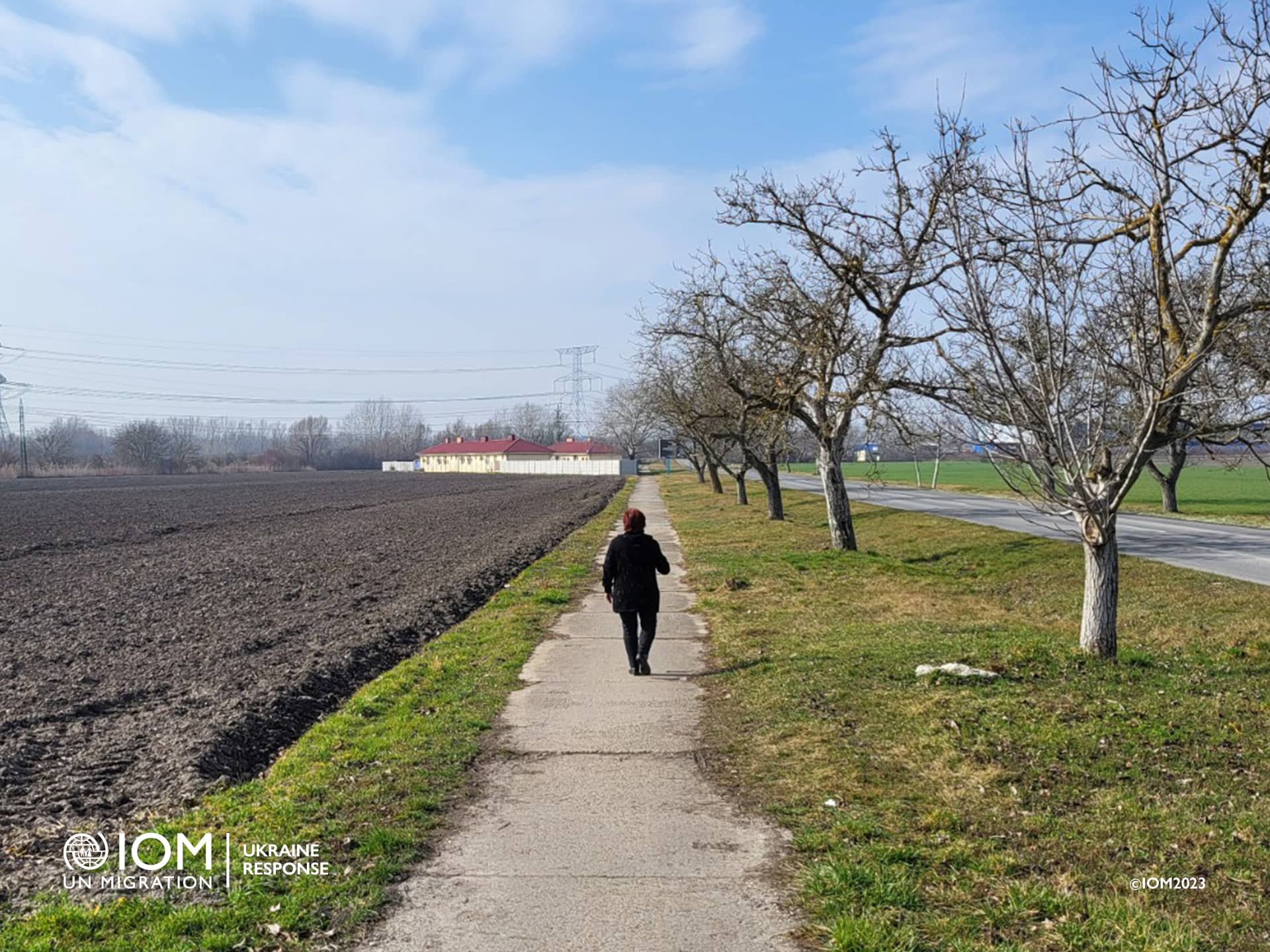
Hanna, a mother of five, came to the Humanitarian Centre in Gabcikovo, Slovakia, from Odesa, Ukraine, while her husband and son joined the Ukrainian army and are fighting in Bakhmut. Photo © International Organization for Migration (IOM) 2023.
Hanna recalls her childhood in the small town of Rakhiv. She signals to the interpreter that it is not necessary to translate everything for her. She has come to manage the Slovak language well over the past months.
When she was 15 years old, Hanna moved to the village of Mykolaivka, not far from Odesa, the third most populous city in Ukraine. She enrolled in vocational secondary school where she learnt the trades of painting and stucco finishing of walls. The years went by as she practised her dream profession. She married twice and had two daughters and three sons.
When Russia's full-scale invasion of Ukraine started in February 2022, Hanna lived in Odesa for more than forty-five years. Odesa, a major seaport and transport hub with twice as many inhabitants as Slovakia’s capital Bratislava, became the target of shelling and airstrikes fired by Russian forces from warships in the Black Sea. Massive explosions were heard everywhere.
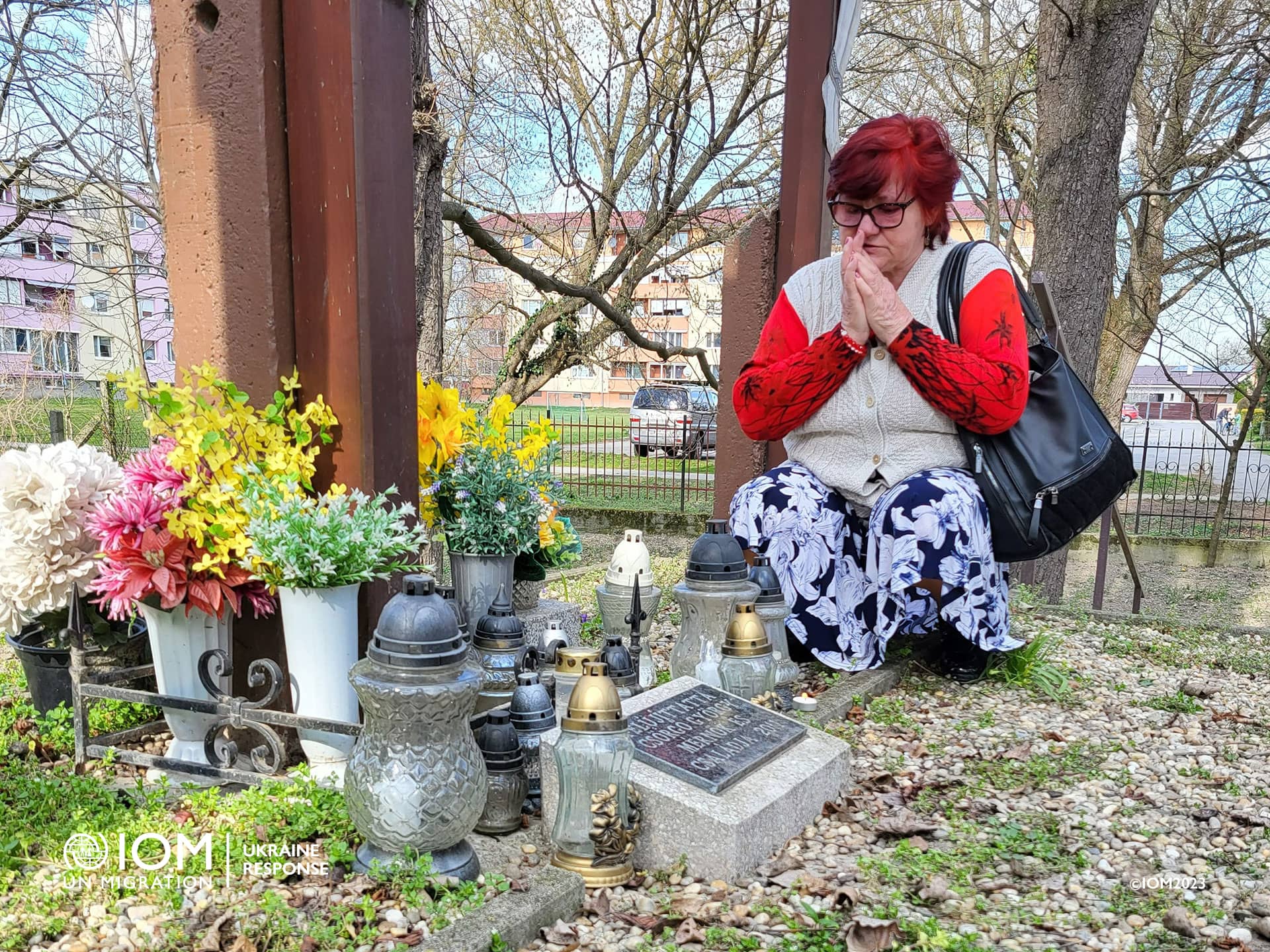
Hanna is extremely worried about the safety of her husband and son fighting in Bakhmut. Yet, at the same time, she is proud of their courage and determination to defend their homeland. Photo © International Organization for Migration (IOM) 2023.
Hanna’s husband Vasyl volunteered for the Ukrainian army the day after the war broke out. “I didn’t want him to join the army in 2014 when Russia invaded the Crimean Peninsula. This time, he did not ask for my permission,” she explains.
Eventually, both Hanna’s husband and their youngest son enrolled in the Ukrainian army in Bakhmut. “In the very hell of Bakhmut,” she adds. One of her sons-in-law was also recently recruited to the military operating in the same area. Hanna is apprehensive about their lives. Tears fill up her eyes as she shows videos and pictures they sent her.
Once cruise missiles started hitting Odesa, people began to flee in large numbers. Hanna, her daughter-in-law and three small grandchildren boarded a packed evacuation train heading to Uzhhorod in Western Ukraine. The journey was exhausting, especially for the children. They were offered to go to Italy, yet they opted for Slovakia which was closer. Finally on 25 March 2022, they arrived at the Humanitarian Centre in Gabcikovo, where the International Organization for Migration (IOM) assists.
Hanna adapted quickly to the new environment. “I am not someone who gives up easily, I do not succumb to hysteria,” she says. It was not her first time abroad as she had been to Czechia for seasonal jobs several times in the past. In Slovakia, she found a job at a petrol station, cleaning car windshields. Later, she would go around to people's houses and offer to wash their windows and help in the garden. Her daughter-in-law found work at a local bakery. The grandchildren enrolled in local schools.
A couple of months later, Hanna found a new job as a cleaner in a supermarket in the nearby town of Dunajská Streda. The daily bus commute of 30 km to work and back to the Humanitarian Centre did not discourage her. There was no bus connection to return to the Centre. When she had a late shift, she would use a bicycle that was given to her by the people for whom she worked.
One night, as she was biking back home, Hanna got hit by a car coming from the opposite way and in a split second, found herself in a ditch by the road. She remembers everything – the pain, the shock, the people who stopped to help her.
This accident completely changed her life. “What did not catch up with me in Ukraine caught up with me later,” Hanna reflects. “I’m happy that I survived”.
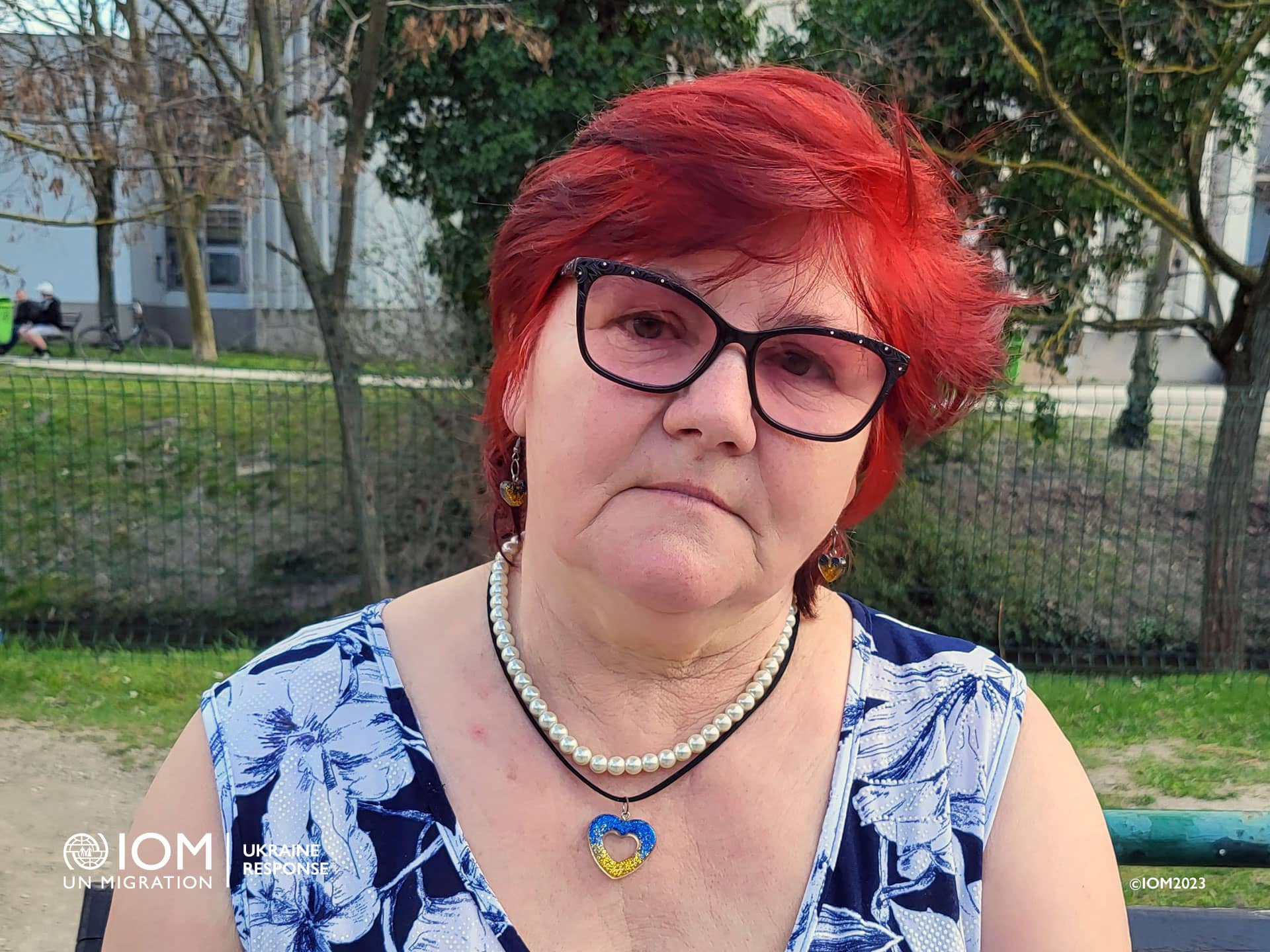
Hanna was hit by a car while biking back from work. Due to numerous injuries, she had to go through three complex surgeries. Photo © International Organization for Migration (IOM) 2023.
Numerous injuries, fractures, lacerations, and contusions required three complex surgeries and several weeks of hospitalisation. At the time, Hanna had no health insurance and, as a holder of temporary protection status, she was only entitled to emergency care.
Hanna returned from the hospital to the Humanitarian Centre in June. Spent her first summer in Slovakia with her left hand in a gypsum bandage, going to check-ups and wound dressings and attending rehabilitation therapy. In August, she underwent another surgery. She had again escaped the worst.
Shortly after, Hanna came to the IOM office in the Humanitarian Centre in Gabcikovo asking for help. She was not able to use her left hand at all. She could not perform simple activities such as dressing herself, combing her hair, or grabbing things. This prevented her from finding a job. Although she had been recommended a post-surgery stay in a specialised facility, she could not afford it due to her social and health insurance situation. “If I had had the option of an employment contract with health insurance included at the time, I would have definitely taken it,” confesses Hanna.
At the Humanitarian Centre in Gabcikovo, from April 2022 till March 2023, IOM provided information, labour and legal counselling, and Slovak language courses. It also distributed material assistance such as blankets, clothes, footwear, and kitchen and hygiene kits, organised community activities and psychosocial support as well as other activities, including shuttle bus transport from Gabčíkovo to Bratislava and Dunajská Streda for almost 1,000 centre residents in the Humanitarian Centre.
Although her needs did not fit into any of these categories, IOM decided to assist Hanna to access all phases of the post-operation treatment procedures in Slovakia.
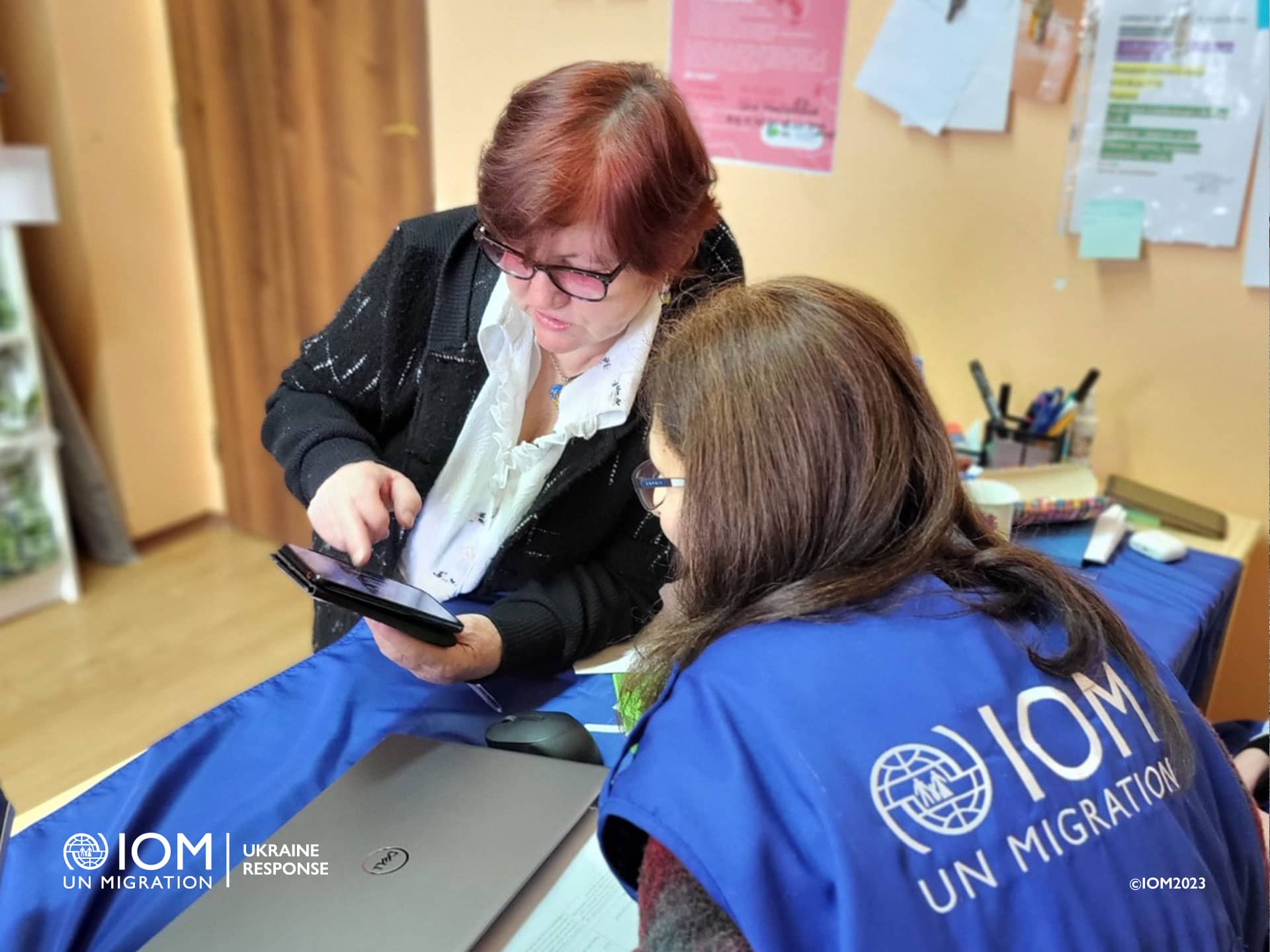
The IOM team in the Humanitarian Centre in Gabcikovo was determined to help Hanna recover after the accident and subsequent surgeries. Photo © International Organization for Migration (IOM) 2023.
Towards the end of the year, Hanna was informed by a facility in Piešťany that she was eligible for a 10-day stay, including treatment procedures, as a pro bono case. “I’m still emotional when I think about the stay. It meant a lot to me,” she recalls.
As she returned from Piešťany in mid-January, Hanna was in much better health. She could walk easier, her left hand was more mobile, and she could even grab a piece of paper with her fingers. Back in Gabčíkovo, she continued rehabilitation therapy.
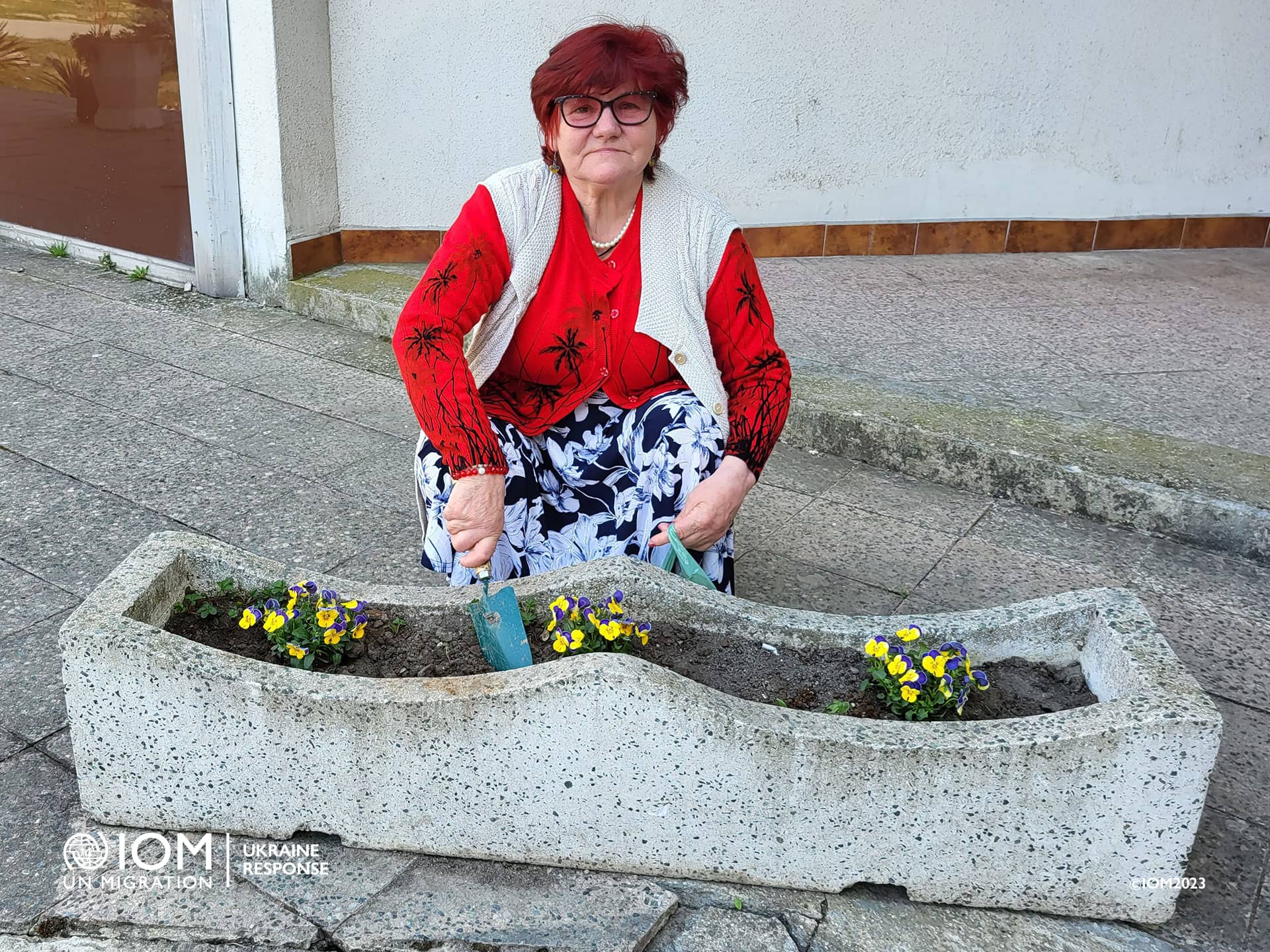
Hanna is determined to return to work and hopes to find an employer to accept her condition. Photo © International Organization for Migration (IOM) 2023.
Today Hanna is feeling better.
“I would like to work but wonder whether I can find an employer who takes an elderly person over 55 with a health issue.”
She hopes to find him, even against the odds. She knows that, in the end, she will cope with everything, as she always has.
Written by Jana Hönschová, IOM Slovakia
Photos by Júlia Kováčová, IOM Slovakia
Discover other inspiring stories of people who have been assisted by IOM:
A Glimmer of Hope In a Tough Year: A Ukrainian Family Starts Anew in Slovakia
New Homes, New Beginnings for Ukrainians in Slovakia
Living in the Moment: Ukrainians Find Hope in Slovakia Away from Shelling and War
“The Heart Wants What It Wants”: A Mother Comes to Grips with a New Reality
With the support of:

U.S. Department of State Bureau of Population, Refugees, and Migration



 Slovenčina
Slovenčina
 Українська (Україна)
Українська (Україна)
 English
English
